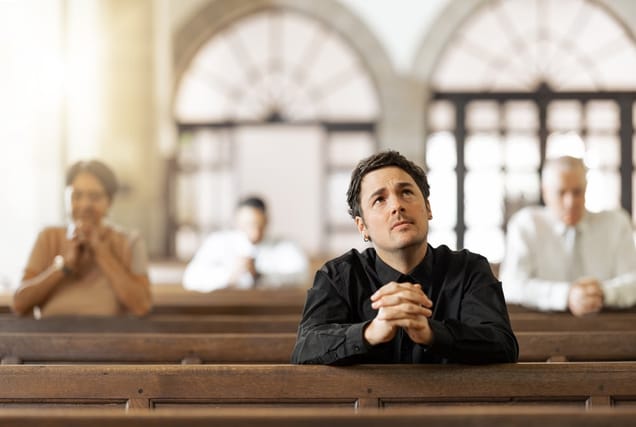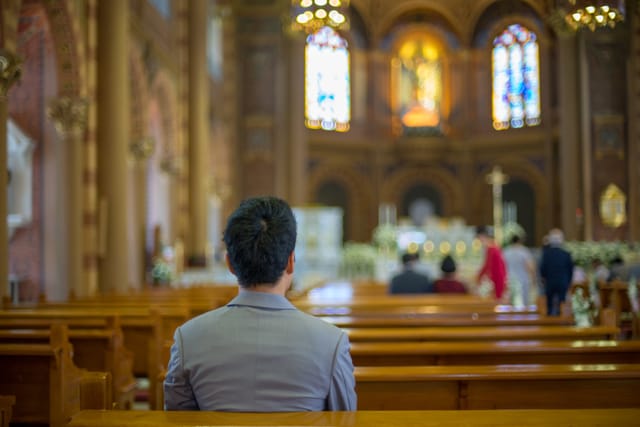Maybe you or someone you know has grappled with their faith — that’s normal.

Many Christians find themselves questioning or leaving the religion they grew up with or any number of reasons. Here are some possible explanations for this shift that offer a glimpse into the struggles and discoveries people face on their evolving spiritual quests.
1. They can’t reconcile faith with a world full of suffering.

The problem of evil is an age-old struggle for people of faith, as Christianity Today explains. If God is all-loving and all-powerful, why do natural disasters, disease, and human cruelty exist? For some, this internal conflict becomes so severe that it shakes their belief system to its core, making it impossible to maintain a faith they feel doesn’t adequately address the pain in the world.
You may also like: 15 Things To Keep To Yourself Because They’re Nobody’s Business But Yours
2. They find contradictions or hypocrisy within religious teachings.

Many people raised in Christianity grapple with inconsistencies or perceived injustices within scripture or religious doctrine. Contradictions about violence in the name of God, restrictive social teachings, or historical wrongdoings by the church can create an insurmountable conflict between a person’s morality and their inherited faith.
Don’t miss out – follow Bolde for exclusive content daily
3. They feel judged or excluded by their religious community.

Sadly, not every religious community embodies Christ’s message of radical love and acceptance. People from the LGBTQ+ community, women seeking leadership roles, those who are divorced, or individuals questioning doctrine often experience ostracism or judgment that pushes them away from the church rather than drawing them closer to God.
You may also like: How A Narcissist Acts When They Can’t Fool You Anymore
4. The focus on sin and judgment outweighs grace and love.

When a religious community becomes more concerned with condemning sin than cultivating kindness and compassion, it distorts the central message of Christ’s teachings. Some Christians leave because they feel their faith community has lost sight of grace and forgiveness and instead promotes an atmosphere of fear and negativity.
Don’t miss out – follow Bolde for exclusive content daily
5. Science and faith seem irreconcilable.

For some, scientific explanations for the origins of the universe and the process of evolution clash with a literal interpretation of the Bible’s creation story. This conflict between science and faith can lead to a crisis of belief, where a person feels forced to choose between their understanding of the world and their religious upbringing. However, as Pew Research Center notes, religion and science aren’t necessarily incompatible — it’s human opinion that creates the rift.
You may also like: 16 Signs You Didn’t Get Enough Affection As A Child
6. Religious institutions are implicated in scandals or abuse.

Sadly, numerous cases of abuse of power, financial corruption, and the systematic cover-up of misconduct occur within religious organizations. When institutions entrusted with spiritual guidance engage in such egregious acts, it profoundly shakes the faith of many believers. They find it impossible to separate their belief from institutions tainted by such scandals.
Don’t miss out – follow Bolde for exclusive content daily
7. They simply no longer believe in the core tenets of Christianity.

Sometimes, the reason for leaving is simply a change in belief. People evolve throughout their lives, and through study, reflection, or life experience, they may conclude that the core concepts of Christianity, such as the divinity of Christ or the concept of heaven and hell, no longer align with their understanding of the universe.
You may also like: 18 Personality Traits Of An Unhappily Married Man
8. They find spiritual fulfillment outside organized religion.
Leaving Christianity doesn’t always mean abandoning spirituality altogether. Some explore different faith traditions, finding a home in Buddhism, Judaism, or more esoteric belief systems. Others find spiritual fulfillment in nature, mindfulness practices, or simply embracing the beauty and mystery of existence without the need for religious dogma.
Don’t miss out – follow Bolde for exclusive content daily
9. Religious communities fail to address social justice issues.

When religious communities stay silent or, worse, become actively opposed to movements for racial equality, human rights, and addressing climate change, it conflicts with the ideals of many Christians. They yearn for a faith that engages with the pressing issues of the world, not one that remains isolated from them.
You may also like: Don’t Share These 15 Things With Anyone – They’re Nobody’s Business But Yours
10. They desire more intellectual inquiry or theological depth.

Some Christians become frustrated when they feel their spiritual questions cannot be sufficiently explored within a restrictive or dogmatic setting. They crave intellectual discussions about faith, philosophy, and the complexities of scripture but find their religious community stifles rather than encourages such open inquiry.
Don’t miss out – follow Bolde for exclusive content daily
11. Rigid doctrine and rules leave no room for personal interpretation.

A faith journey is a constant evolution of understanding and belief. When religious doctrine leaves no space for individual interpretation or questions, some Christians feel stifled. They struggle to fit their unique experiences and evolving beliefs within a rigid and prescriptive framework.
You may also like: Things Narcissists Say To Shut You Down When You Confront Them
12. They find Christian culture off-putting.
 Shutterstock
Shutterstock
Unfortunately, some expressions of Christianity have become associated with consumerism, toxic positivity, or close-mindedness. For many, this unappealing “Christian culture” overshadows the true heart of the faith, becoming a major barrier to feeling belonging within it.
Don’t miss out – follow Bolde for exclusive content daily
13. Religion becomes associated with past trauma or abuse.

It’s heartbreaking but true – often, people leave Christianity because of painful experiences within a religious setting. Spiritual abuse, legalism, or emotional manipulation can create deep wounds. Distancing themselves from organized religion becomes a necessary step towards healing and reclaiming spiritual life on their own terms.
You may also like: 15 Types Of People You Should Never Trust In Life
14. They feel an increasing sense of apathy.

Sometimes, there’s no dramatic crisis of faith. Instead, people slowly drift away from organized religion due to a dwindling sense of connection. Religious practices that once held meaning may start to feel empty or obligatory. As their priorities shift, their participation and belief gradually fade.
Don’t miss out – follow Bolde for exclusive content daily
15. Life changes create shifts in priorities.

Major life events – a move, a new career, raising children – can alter a person’s relationship with faith. Suddenly, the routines and structures of organized religion no longer fit their lifestyle or new needs. While their belief might remain, active participation in a religious community becomes less central to their life.
You may also like: 15 Clever Phrases That Instantly Humble an Arrogant Person
16. They don’t feel like they belong.

A sense of belonging to a community is crucial for many who engage in organized religion. However, sometimes people simply never find their place within a particular church or denomination. If they don’t experience that sense of connection and spiritual kinship, it’s difficult to maintain commitment to a religious community that feels unwelcoming or foreign.
Enjoy this piece? Give it a like and follow Bolde on MSN for more!




